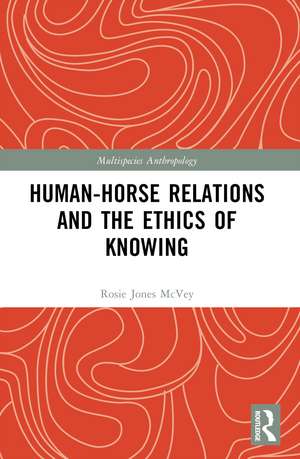Human-Horse Relations and the Ethics of Knowing: Multispecies Anthropology
Autor Rosalie Jones McVeyen Limba Engleză Paperback – 9 oct 2024
| Toate formatele și edițiile | Preț | Express |
|---|---|---|
| Paperback (1) | 391.02 lei 6-8 săpt. | |
| Taylor & Francis – 9 oct 2024 | 391.02 lei 6-8 săpt. | |
| Hardback (1) | 868.22 lei 3-5 săpt. | +27.45 lei 6-10 zile |
| Taylor & Francis – 31 mar 2023 | 868.22 lei 3-5 săpt. | +27.45 lei 6-10 zile |
Preț: 391.02 lei
Nou
Puncte Express: 587
Preț estimativ în valută:
74.83€ • 77.30$ • 62.28£
74.83€ • 77.30$ • 62.28£
Carte tipărită la comandă
Livrare economică 26 martie-09 aprilie
Preluare comenzi: 021 569.72.76
Specificații
ISBN-13: 9781032186801
ISBN-10: 1032186801
Pagini: 264
Dimensiuni: 156 x 234 mm
Greutate: 0.49 kg
Ediția:1
Editura: Taylor & Francis
Colecția Routledge
Seria Multispecies Anthropology
Locul publicării:Oxford, United Kingdom
ISBN-10: 1032186801
Pagini: 264
Dimensiuni: 156 x 234 mm
Greutate: 0.49 kg
Ediția:1
Editura: Taylor & Francis
Colecția Routledge
Seria Multispecies Anthropology
Locul publicării:Oxford, United Kingdom
Public țintă
AcademicNotă biografică
Rosalie Jones McVey is a Junior Research Fellow at the University of Cambridge, UK. A social anthropologist, her interests lie in the anthropology of ethics, human/animal relations, and cognition. She has worked around the world as a horse trainer for a number of years.
Cuprins
Introduction: #Two Hearts and Tall Tales
1 Who Belongs in the Horse World Now?
2 "Learn From the Horse, Don’t Label Him!"
3 Articulating Equine Characters and Human Virtues
4 Infantilisation and the Ethics of the Un-real
5 Qualifying the Centaur
Conclusion: Never Straight from the Horse’s Mouth
1 Who Belongs in the Horse World Now?
2 "Learn From the Horse, Don’t Label Him!"
3 Articulating Equine Characters and Human Virtues
4 Infantilisation and the Ethics of the Un-real
5 Qualifying the Centaur
Conclusion: Never Straight from the Horse’s Mouth
Recenzii
"I am enthralled...don't know when I have enjoyed a manuscript so much" - Professor Dame Marilyn Strathern, University of Cambridge
"This is a first-rate book. The ethnography is rich and very sensitively and imaginatively interpreted. And the analysis is consistently penetrating and original... I think certain to be influential." - James Laidlaw, William Wyse Professor of Social Anthropology, University of Cambridge
"This book represents a highly original and subtle accounting of alternative horsemanship in the UK. With insightful interventions into a range of debates, especially within multispecies ethnography and the anthropology of ethics, Human-Horse Relations and the Ethics of Knowing breaks new ground. It invites us to think again about the relationships of engagement and detachment between horse and rider. Most impressively, it crafts a careful and beautifully rendered description of ideologies of training in practice and gets us to consider afresh the tensions and freedoms expressed through such form of human-animal partnership. A wonderful read." - Adam Reed, University of St Andrews
"This is a first-rate book. The ethnography is rich and very sensitively and imaginatively interpreted. And the analysis is consistently penetrating and original... I think certain to be influential." - James Laidlaw, William Wyse Professor of Social Anthropology, University of Cambridge
"This book represents a highly original and subtle accounting of alternative horsemanship in the UK. With insightful interventions into a range of debates, especially within multispecies ethnography and the anthropology of ethics, Human-Horse Relations and the Ethics of Knowing breaks new ground. It invites us to think again about the relationships of engagement and detachment between horse and rider. Most impressively, it crafts a careful and beautifully rendered description of ideologies of training in practice and gets us to consider afresh the tensions and freedoms expressed through such form of human-animal partnership. A wonderful read." - Adam Reed, University of St Andrews
Descriere
This book explores how equestrians are highly invested in the idea of profound connection between horse and human and focuses on the ethical problem of knowing horses.


